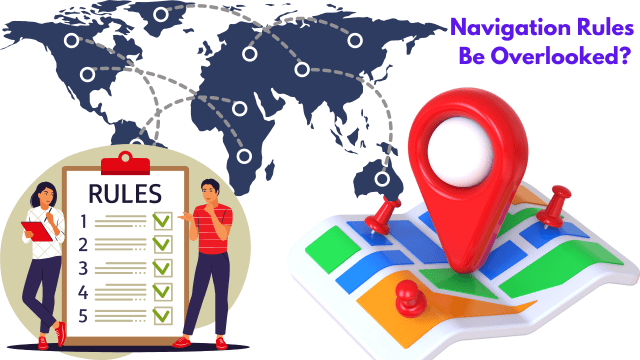Navigating the vast oceans requires adherence to a set of Navigation Rules Be Overlooked rules and guidelines known as navigation rules. These regulations, created to ensure the safety and efficiency of maritime travel, are essential for smooth sailing. However, there are situations when these rules can be overlooked, allowing flexibility in certain circumstances. In this blog post, we will explore the exceptions when navigation rules may be disregarded, shedding light on scenarios where sailors can deviate from the standard practices while maintaining a secure voyage.
Exceptions to Navigation Rules
- Emergency Situations: Navigation rules can be temporarily set aside when faced with an imminent threat to life or property. Such emergencies may include severe weather conditions, equipment failure, or need to assist another vessel in distress. While it is crucial to prioritize safety, any deviation from navigation rules should be carefully considered and communicated to nearby vessels to avoid further risks.
- Navigational Obstacles: In cases where following the navigation rules would lead to a collision or grounding, mariners can deviate from the established guidelines. This exception applies when encountering unforeseen obstructions, such as uncharted reefs, floating debris, or sudden changes in water depth. However, it is important to exercise caution and adhere to the rules when the obstacle is bypassed.
- Special Circumstances: Certain situations, such as participating in maritime events or ceremonies, may require temporarily overlooking navigation rules. Relevant authorities typically authorize these exceptions and should be followed with careful coordination to ensure the safety of all involved parties. It is crucial to obtain proper permissions and maintain clear communication to minimize potential accidents or confusion.
- Local Regulations: Local authorities may establish alternative navigation rules in specific areas to accommodate unique conditions or local customs. These regulations, known as special rules, take precedence over general navigation rules within their designated zones. Mariners navigating these areas should familiarize themselves with these local rules and follow them accordingly to avoid penalties or endangering themselves and others.
- Understanding Navigation Rules: Before discussing the scenarios where navigation rules can be overlooked, let’s first understand their significance. Navigation rules define the layout and structure of a website’s menus, links, and overall navigation system. They ensure that users can easily find and access the desired content on a website.
- Scenario 1: Landing Pages or Single-Purpose Websites: Sometimes, you may create landing pages or single-purpose websites designed for a specific campaign or promotion. These pages often have a narrow focus and prioritize a particular call to action. Deviating from the standard navigation rules by removing unnecessary links and menus can help maintain user attention and guide them towards the desired action.
- Scenario 2: Progressive Disclosure: Implementing progressive disclosure techniques can enhance the user experience when dealing with complex content or long-form articles. Progressive disclosure involves revealing information gradually as users interact with the content. In such cases, temporarily hiding the main navigation elements can reduce distractions and improve readability.
- Scenario 3: Customized User Journeys: Websites that offer personalized experiences or cater to specific user segments can benefit from customized navigation paths. By presenting different navigation options based on user preferences or previous interactions, you can create a more tailored and intuitive browsing experience. However, it’s essential to ensure that users can still access essential sections of your website if needed.
FAQs
Q1: Are there any consequences for overlooking navigation rules?
A1: Yes, disregarding navigation rules without valid reasons can lead to accidents, collisions, legal repercussions, or loss of life and property. It is crucial to prioritize safety and adhere to the rules whenever possible.
Q2: How can sailors stay informed about local regulations?
A2: Sailors can obtain information about local regulations through navigational charts, maritime authorities, or consulting local boating organizations. Staying updated and informed is essential to ensure compliance with the specific rules in different regions.
Q3: Can navigation rules be modified in extreme weather conditions?
A3: While extreme weather conditions may require adjustments in navigation techniques, it is essential to maintain compliance with safety protocols. Deviating from navigation rules should only occur if it is the safest action in the given circumstances.
Q4: Will overlooking navigation rules affect my website’s SEO?
A1: Overlooking navigation rules in specific scenarios should be fine with your website’s SEO if implemented correctly. However, it’s crucial to consider the overall user experience and ensure that essential pages remain accessible.
Q5: How can I ensure users can return to the main menu?
A2: When deviating from navigation rules, it’s important to provide alternative ways for users to access your website’s main menu or essential sections. This can be achieved through strategically placed breadcrumbs, contextual menus, or prominent call-to-action buttons.
Conclusion
While navigation rules provide a crucial framework for maritime safety, there are situations when deviations are necessary to ensure the well-being of sailors and their vessels. Emergencies, navigational obstacles, special circumstances, and local regulations all present exceptions to the standard guidelines. However, it is essential to approach these exceptions with caution and prioritize safety at all times. By understanding when navigation rules can be overlooked and following the proper procedures, sailors can navigate challenging situations while maintaining a secure and efficient voyage on the high seas.

